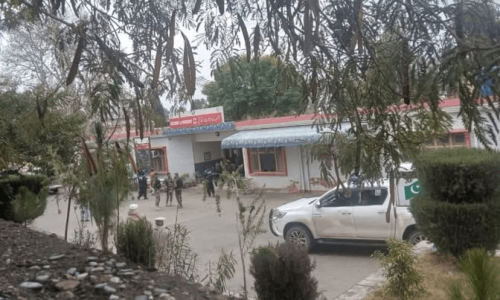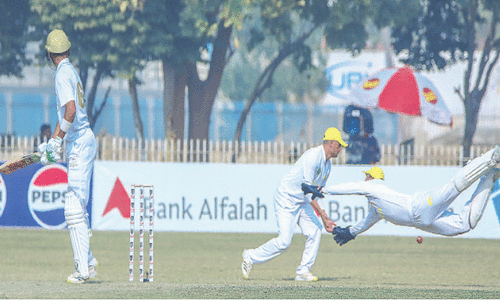Poets today are happy to remain part of a convivial fraternity. With little patronage to compete for and minimal ideological divide, the desire for rhyming ripostes and public put-downs hardly exists. It wasn’t always so. Previously poets were often rivals and lost no opportunity in exchanging barbs couched in deadly but exquisite eloquence.
Muhammed Ibrahim Zauq and Mirza Asadullah Baig Khan, better known as Ghalib, were bitter rivals, for example, and unleashed several lyrical fusillades against each other to win Mughal emperor Bahadur Shah Zafar’s favours. From the days of Ghalib, mushairas (poetry recitals) were not just a platform for dissent against the state, but also opportunities to protest against other members of the poetic community to highlight ideological differences.
Among the more recent examples of such poetic friction was the Bayaad-i-Josh mushaira held on April 13, 1982. Organised by the Anjuman-i-Saadat-i-Amroha at a time of great censorship because of Gen Zia’s dictatorial regime, it was a memorial for Josh Malihabadi, whose death on February 22, 1982 had been ignored by the state. Members of the Amrohvi community in Karachi had the intellectual gravitas to brave the political backlash. The event featured some of the greatest Urdu poets of the time, who were witness to an episode that highlighted the ideological differences of Josh Malihabadi and Hafeez Jalandhari, one a fierce critic of dictators and the other a close supporter.

Josh Malihabadi had immigrated to Pakistan several years after Partition and was never at ease in his new country. He had been a part of India’s intellectual elite, and a darling of the Congress leadership. So iconic was Josh in India that Vijay, the protagonist from Guru Dutt’s cult classic Pyaasa, wants to be a revolutionary poet just like Josh. Vijay snubs the more populist genre of romantic poetry, for which he suffers great hardship.
Despite his position in India, Josh gave in to the entreaties of A.T. Naqvi, commissioner of Karachi, who had told him, “Josh Sahib, you can’t cross a river with your feet anchored in two boats.” Against the advice of Indian PM Jawaharlal Nehru, who gave him the option to move back and forth between the two countries, Josh left India thinking that Urdu would be ignored there because of the “narrow-minded nationalism of Hindus.” In 1955, he crossed the border and, soon after, became a fierce critic of the military dictatorship of Ayub Khan. For this he faced endless problems, becoming the target of right-wingers while his property was confiscated by the regime. His poetry too did not get the requisite recognition from the state.
Josh Malihabadi and Hafeez Jalandhari were at polar ends of an ideological divide that led to a poetic crescendo at the Bayaad-i-Josh mushaira in 1982
On the other side of the political divide were pro-establishment writers and poets, chief among them Hafeez Jalandhari, the poet laureate, who had also penned Pakistan’s national anthem. Their ideological divide was stark. Josh hated the British and sported the Führer’s moustache to remind them of their bête noire. In his poem East India Company Ke Farzandon Se Khitab [Address to the Heirs of the East India Company], Josh had lambasted British hypocrisy and recounted their crimes, from the battle of Plassey in 1757 to hanging the revolutionary Bhagat Singh in 1931. Invoking the powerful imagery of Karbala, he had addressed their apologists:
Mujrimon ke waastay zeba nahin ye shor-o-shain
Kal Yazeed-o-Shimr thhey aur aaj bantay ho Hussain!
[This hue and cry does not suit the defence of criminals/ You who were Yazeed and Shimr yesterday pretend today to be Hussain!]
Like anti-British revolutionary Subhas Chandra Bose, who was even willing to ally himself with fascists to gain independence for India, Josh considered the British to be the ultimate enemy and published this poem in 1939 as the British were exploiting India in preparation for World War II.
Meanwhile, Hafeez Jalandhari was using his pen to support the British war effort. During World War II, as the head of the Bureau of Public Information and Song Publicity Organisation at All India Radio, Jalandhari played an important role for British propaganda. According to several accounts, he wrote poems such as Boot to recruit Indian cannon fodder that would eventually die in North Africa and East Asia for their colonial masters:
Idhar pehno ho tooti jooti, udhar pehno ge boot
Bharti ho jao!
[Here you wear a broken slipper, there you will get a fancy boot/ Go join the army!]

Jalandhari was able to get on the right side of the political players even after the Partition of the Subcontinent. While Tagore was the poet for India’s and later Bangladesh’s national anthems, Pakistan opted for a poet who is not part of the Urdu poetry pantheon but was still chosen out of 723 entrants. Rewards came quick and fast, he became the Director General of Morals in the Pakistan Armed Forces and an adviser to General Ayub Khan, an appointment which inspired Jalib to write his poem Musheer [Adviser].
As Jalib narrated, he happened to meet Jalandhari at Anarkali market in Lahore, who told him that he was exceedingly busy, as he had been appointed as an adviser. In response, Jalib sarcastically asked him, “Adviser to God?”. Protests were raging against Ayub Khan at the time, and Jalib caustically advised Jalandhari to lock up every black flag-raising protester and the Dastoor [Constitution]-reciting poet himself, who was daring to go against his president. In Musheer he proceeded to put into verse what he had said to Jalandhari:
Das crore yeh gadhay
Kya banein ge hukmaraan
[These hundred million fools/ cannot ever be rulers]
Given all this, it is hard to find two people more ideologically different than Josh and Jalandhari. This divide became personal when Jalandhari presented his work Shahnama-i-Islam to Josh and he curtly dismissed it by asking what Islam had to do with shahs [kings]? This rebuke and Josh’s leftist writings had infuriated Jalandhari. As the director of the Writers’ Guild, he could have played a role in suppressing Josh’s poetry, and on Josh’s demise, the Urdu daily Nawa-i-Waqt, published an article featuring a statement by Jalandhari that included this verse by Ghalib:
Huay mar ke hum jo ruswa huay kyon na gharq-i-dariya
Na kabhi janaza uthta na kahien mazar hota
[Disgraceful death like this; why did I not die by drowning in a river/ There would have been no funeral ever, and nowhere a tomb]
The article was headlined with his statement, “Marnay seh pehle usay mar jana chaahiye tha. Islam, Huzoor-i-Pak, aur Pakistan ke dushman ka muamla ab Allah ke haath mein hai” [Josh should have died before his death. The fate of the enemy of Islam, the Holy Prophet (PBUH) and Pakistan is now in the hands of Allah.] This underhanded blow was condemned by the poet community. Faiz dismissed it saying, “Hadd ho gayi!” [It’s crossed all limits!] and Naseem Amrohvi recited at Josh’s chehlum:
Bazon ne woh bayaan diye hain ghalat ghaleez
Sari fazaayen cheekh uthi hain al Amaan
al Hafeez!
[Some have given statements so false and filthy/ Even the winds are screaming: Allah safeguard us]
The issue was smouldering and now at the Bayaad-i-Josh mushaira, Josh’s friend Mahinder Singh Bedi responded on behalf of his departed friend to Jalandhari ’s unkind slur. An Indian was defending a Pakistani poet, proving that common decency, much like poetry, transcends petty politics.

After extolling Josh’s many virtues in his eulogy, he came to the crux of the matter. Bedi first laid the groundwork, saying that some people might not like what he was about to recite but, bitter as it might be, the truth must be told. The audience of thousands tensed in anticipation. The hum and buzz of the crowd was replaced by a stillness; the listeners did not want to miss a word of what was going to be said. Bedi led the charge in a voice heavy with emotion and suppressed outrage:
Afsoos taanazan hain ghulamaan-i-khanazaad
Jin ke qaseeday ab bhi hain afrangiyon ko yaad
Zagh-o-zahan bhi boleeyan ab bolnay lagay
Shaheen jo urr gaya to yeh mounh kholnay lagay
[Unfortunate that the sons of slaves are taunting/ Whose paeans for the British are still remembered/Magpies and kites have started opening their beaks/ Now that the falcon has departed, they have become emboldened]
The audience immediately understood the context and went hoarse in its praise, begging Bedi to repeat the verses. He had settled the score and reminded Jalandhari of his services to the imperial masters, previous and current. Later in the evening, Jalib proceeded to recite Musheer, a resounding double act of poetic dissent proving that, even dead and ignored by the state, Josh was the celebrated poet and, though alive and the establishment’s man, there would be a reckoning for Jalandhari by his peers.
Jalandhari did not survive Josh very long; he passed away on December 21, 1982. A man close to political circles in death as in life, his body rests in a tomb built by the government near the Minar-i-Pakistan in Lahore. Josh’s death was ignored by the state. Seeing this, Sadequain expressed a desire to build his grave, but the poet — whose pen targeted everyone from colonial masters to colonial servants and whose defiant words echo even today — was laid to rest in a simple white marble grave in Islamabad. The epitaph of the “Shair-i-Inqalab” [Poet of Revolution] who never bowed or bent fittingly reads:
Aainda zamanay ki amanat hoshiyar
Uth lehde moujud ki khoraak na ban
[You are the hope for the coming times, beware/Rise and do not become food for the worms!]
The writer is an independent researcher.
He tweets @Sibtain_n
Published in Dawn, EOS, July 31st, 2020















































